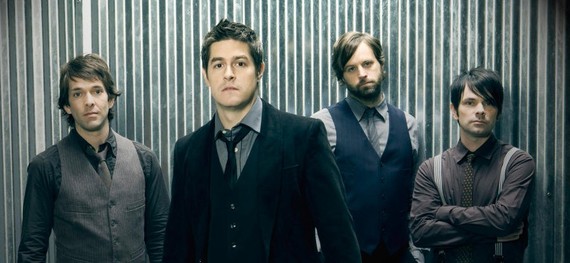An academic community is nothing if we are not allowed to ask questions. In the Christian community, there's apparently a lot wrong with questioning beliefs, since merely tweeting on his twitter account has gotten Dan Haseltine, front man of Christian band Jars of Clay, labeled a heretic. On April 19, Dan tweeted questions on the legitimacy of traditional biblical interpretations on homosexuality. As expected, dozens of "concerned" Christians pounced aggressively attacking Dan's seemingly lapse in judgment.
Dan is just one of many Christians having to ask these questions as their cognitive dissonance between what is said from their pulpits and their interactions with LGBT people continues to grow. As this conversation continues, what many conservative Christian churches have offered has only been the same regurgitated theological stances. What we've been lacking is a practical approach to the LGBT community even within those theological stances. Dan questioned his theological beliefs, and did so publicly, in what I'm assuming was an attempt to have a public discourse. What Dan wasn't aware of is how heated this conversation can quickly become.
His public inquiries landed him on the wrong side of the line as defined by conservative Christians. Dan's questions have shown that the LGBT question is the end all for conservative Christianity. This has become a question of orthodoxy and even just doubting your theological view can put you in the line of fire.
But shouldn't we not only allow, but actually encourage, questions on theology?
It seems well intentioned Christians aren't given much leeway for anything but the status quo. But as we have seen in the past, Christians have gotten it wrong before. Our theology is constantly adapting to new information, and our doubts have let us question our former stances to reach higher levels of understanding.
Doubt is not an admission of unbelief; they are a statement of our innate need for more. Questioning beliefs is a healthy, natural process. It is only by questioning that we will continue to grow in our faith. When we settle, we become complacent and we lose out on the opportunity to have a closer relationship with Jesus Christ, who is both the message and the messenger. This is not a process that ends, but a journey in which we take steps forward into the dark with faith that Jesus is at the beginning and end of it all.
The folks at Christian Post would rather you stick to what they tell you to believe. Ominously titled "The Shattering of Jars of Clay," a piece riddled with inaccuracies, including the logical fallacy of the "slippery slope," the Christian Post piece attacks Dan Haselstine for asking questions. The piece (which really works more as a self-promoting piece for the authors work against homosexuality) doesn't add anything to this conversation. It only encourages people to stay silent with their questions, and to stay in line within traditional beliefs.
In perhaps one of the most critical points the Christian Post decides to negate the needs for LGBT stories within this conversation.
...many of us have gay friends or relatives, and our positions are motivated by love. But what does having a gay friend or relative have to do with understanding God and his Word?...Do we rewrite the Bible to accommodate our sentiments towards others, just because they are nice people?
What this author doesn't seem to quite grasp, neither does many vocal opponents of LGBT people, is that LGBT stories are necessary for context of our theology. Without LGBT stories, we are speaking about a few verses in a theoretical fashion. We're discussing people. We are not sex acts. In order for us to have a reasonably, intellectual conversation on this subject, stories are needed. Dan isn't asking to rewrite the bible. He is asking for context to the conversation to better understand the Bible.
The assertion that Dan, or any other who choose to question their sincerely held beliefs homosexuality (or if we are being honest, same-sex sex) are no longer believers is absurd. Do we really base who is a Christian by this one question? Forget our beliefs in Christ resurrection, His sacrifice on the cross, or Christ's unconditional love for us. Forget our doctrines and our worship practices. No, those beliefs no longer matter. Because if you even question your stance on same-sex sex, you no longer believe in the entire bible.
That's obviously not true, as there are many Christians who are both supportive of same-sex relationships, and LGBT people who are Christians. Both groups believe in the bible and just because they have perhaps come to different theological conclusions than you doesn't make them any less of a Christian. Dan may never be theologically LGBT affirming. He may never agree that same-sex relationships are acceptable in God's eyes ,or that same-sex marriage should be extended for the queer community. But like Isaiah 64:8 says, "We are the clay, you are the potter; we are all the work of your hand."; Dan is willing to ask questions and let God lead him." That's how Christians everywhere should approach all theological subjects. The day we're too afraid to ask questions is the day we have stopped growing in our relationships with Christ.
